Intercultural Communication Encounter Report: A Personal Reflection
VerifiedAdded on 2022/10/08
|7
|1751
|15
Report
AI Summary
This report details a student's experience during a university exchange program in Egypt, focusing on an intercultural communication dilemma within a team project. The student reflects on the challenges of leading a team with diverse cultural backgrounds, particularly the clash between a dominant team member's approach and the Egyptian students' behavior. The report explores concepts like "otherization" and the importance of understanding cultural differences in business settings. It proposes a research question about the expectations of an expatriate manager, outlines a secondary data collection methodology, and discusses the evaluation and analysis process. The postscript connects the experience to key concepts from intercultural communication literature, such as globalization, identity, and the ideas of Hofstede. The report underscores the value of learning about various cultures and the need for self-awareness in intercultural communication, emphasizing that people, not cultures, meet.
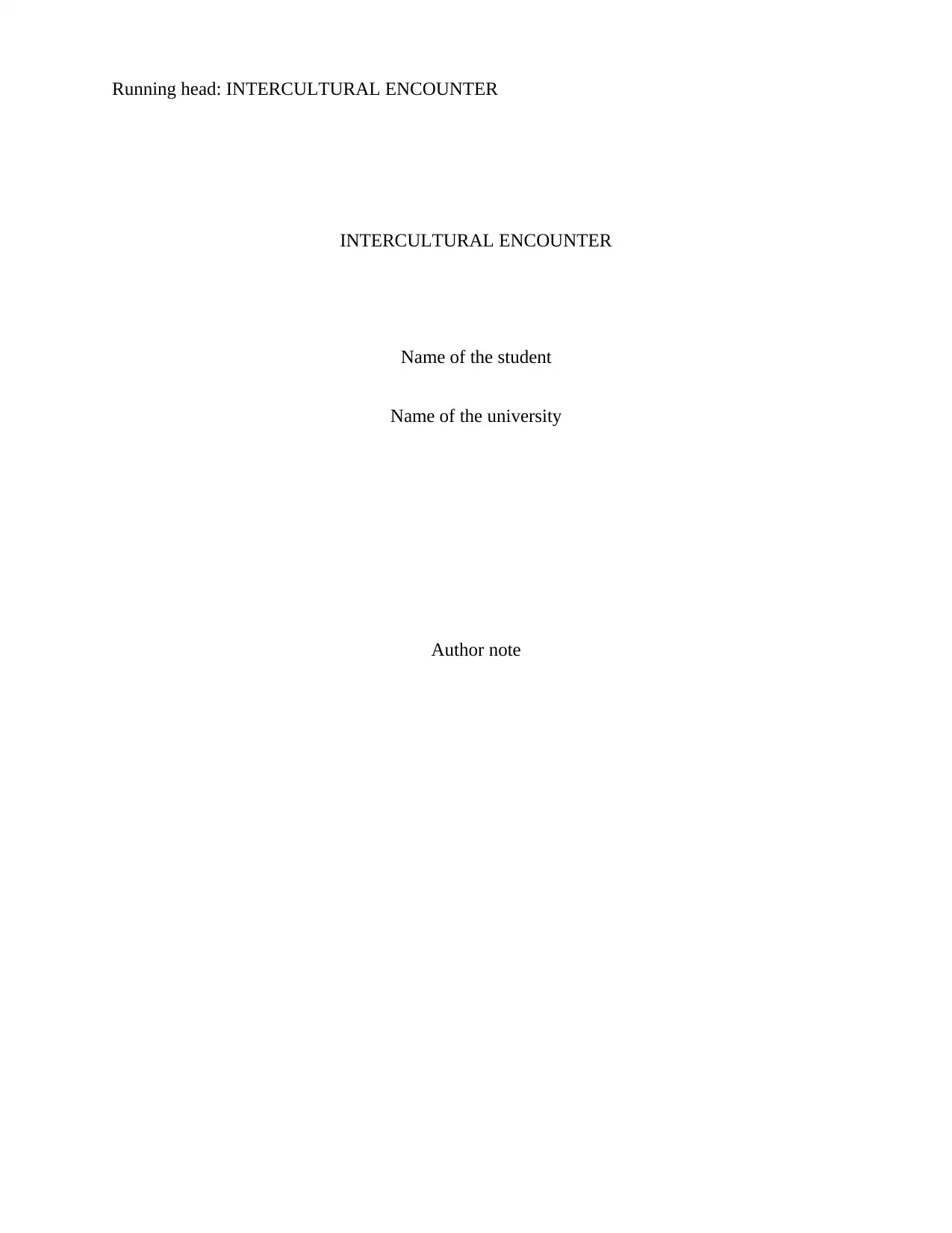
Running head: INTERCULTURAL ENCOUNTER
INTERCULTURAL ENCOUNTER
Name of the student
Name of the university
Author note
INTERCULTURAL ENCOUNTER
Name of the student
Name of the university
Author note
Paraphrase This Document
Need a fresh take? Get an instant paraphrase of this document with our AI Paraphraser
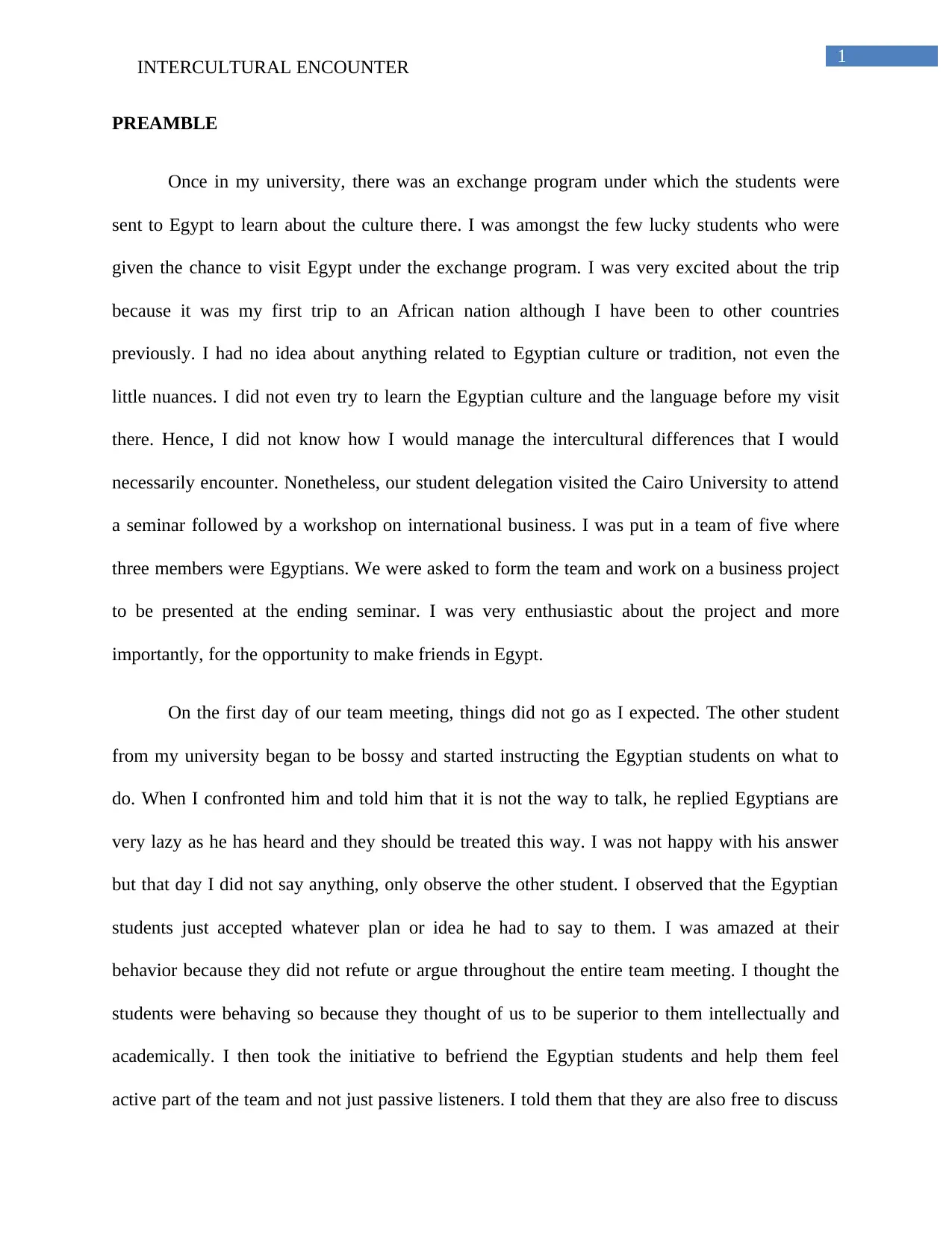
1
INTERCULTURAL ENCOUNTER
PREAMBLE
Once in my university, there was an exchange program under which the students were
sent to Egypt to learn about the culture there. I was amongst the few lucky students who were
given the chance to visit Egypt under the exchange program. I was very excited about the trip
because it was my first trip to an African nation although I have been to other countries
previously. I had no idea about anything related to Egyptian culture or tradition, not even the
little nuances. I did not even try to learn the Egyptian culture and the language before my visit
there. Hence, I did not know how I would manage the intercultural differences that I would
necessarily encounter. Nonetheless, our student delegation visited the Cairo University to attend
a seminar followed by a workshop on international business. I was put in a team of five where
three members were Egyptians. We were asked to form the team and work on a business project
to be presented at the ending seminar. I was very enthusiastic about the project and more
importantly, for the opportunity to make friends in Egypt.
On the first day of our team meeting, things did not go as I expected. The other student
from my university began to be bossy and started instructing the Egyptian students on what to
do. When I confronted him and told him that it is not the way to talk, he replied Egyptians are
very lazy as he has heard and they should be treated this way. I was not happy with his answer
but that day I did not say anything, only observe the other student. I observed that the Egyptian
students just accepted whatever plan or idea he had to say to them. I was amazed at their
behavior because they did not refute or argue throughout the entire team meeting. I thought the
students were behaving so because they thought of us to be superior to them intellectually and
academically. I then took the initiative to befriend the Egyptian students and help them feel
active part of the team and not just passive listeners. I told them that they are also free to discuss
INTERCULTURAL ENCOUNTER
PREAMBLE
Once in my university, there was an exchange program under which the students were
sent to Egypt to learn about the culture there. I was amongst the few lucky students who were
given the chance to visit Egypt under the exchange program. I was very excited about the trip
because it was my first trip to an African nation although I have been to other countries
previously. I had no idea about anything related to Egyptian culture or tradition, not even the
little nuances. I did not even try to learn the Egyptian culture and the language before my visit
there. Hence, I did not know how I would manage the intercultural differences that I would
necessarily encounter. Nonetheless, our student delegation visited the Cairo University to attend
a seminar followed by a workshop on international business. I was put in a team of five where
three members were Egyptians. We were asked to form the team and work on a business project
to be presented at the ending seminar. I was very enthusiastic about the project and more
importantly, for the opportunity to make friends in Egypt.
On the first day of our team meeting, things did not go as I expected. The other student
from my university began to be bossy and started instructing the Egyptian students on what to
do. When I confronted him and told him that it is not the way to talk, he replied Egyptians are
very lazy as he has heard and they should be treated this way. I was not happy with his answer
but that day I did not say anything, only observe the other student. I observed that the Egyptian
students just accepted whatever plan or idea he had to say to them. I was amazed at their
behavior because they did not refute or argue throughout the entire team meeting. I thought the
students were behaving so because they thought of us to be superior to them intellectually and
academically. I then took the initiative to befriend the Egyptian students and help them feel
active part of the team and not just passive listeners. I told them that they are also free to discuss
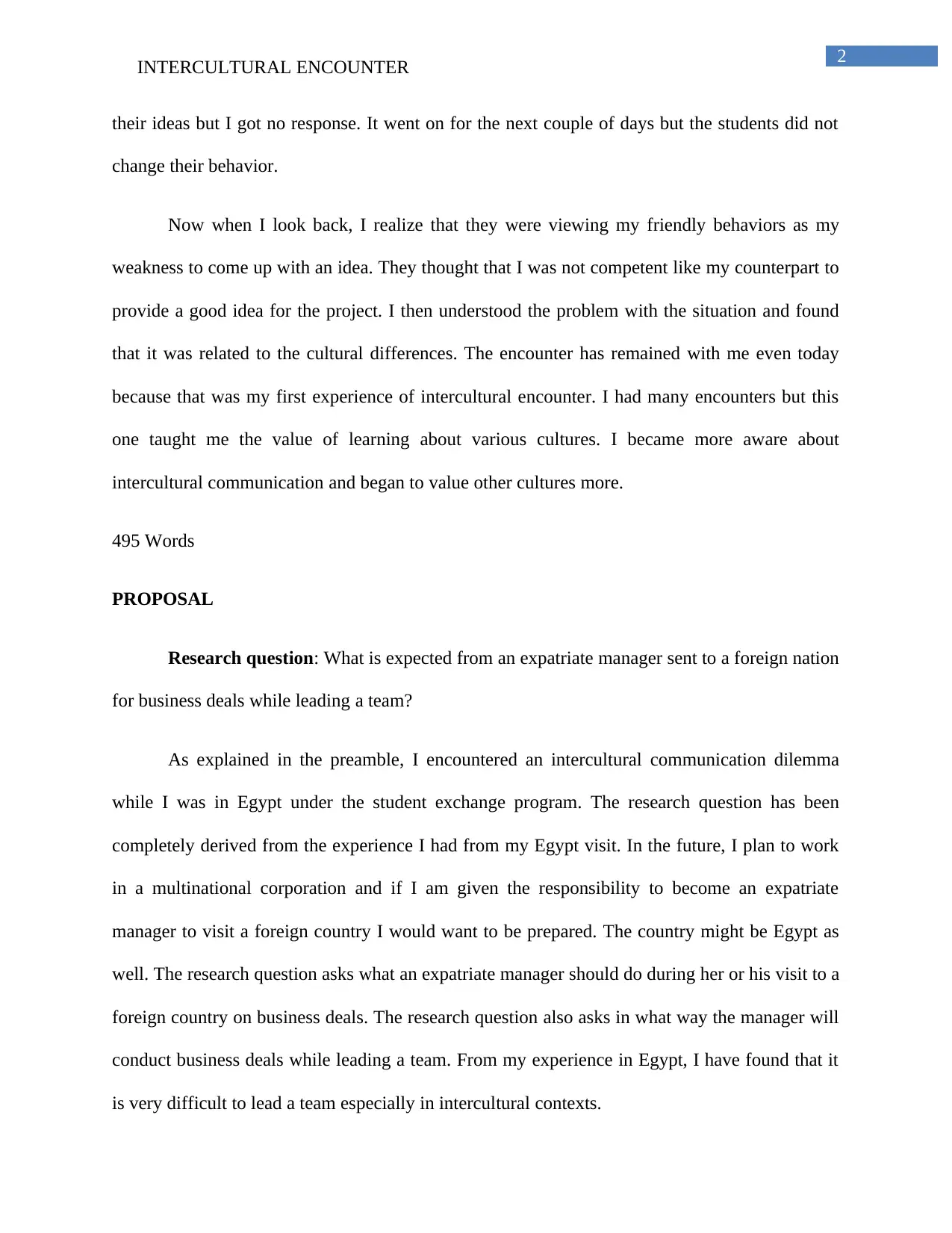
2
INTERCULTURAL ENCOUNTER
their ideas but I got no response. It went on for the next couple of days but the students did not
change their behavior.
Now when I look back, I realize that they were viewing my friendly behaviors as my
weakness to come up with an idea. They thought that I was not competent like my counterpart to
provide a good idea for the project. I then understood the problem with the situation and found
that it was related to the cultural differences. The encounter has remained with me even today
because that was my first experience of intercultural encounter. I had many encounters but this
one taught me the value of learning about various cultures. I became more aware about
intercultural communication and began to value other cultures more.
495 Words
PROPOSAL
Research question: What is expected from an expatriate manager sent to a foreign nation
for business deals while leading a team?
As explained in the preamble, I encountered an intercultural communication dilemma
while I was in Egypt under the student exchange program. The research question has been
completely derived from the experience I had from my Egypt visit. In the future, I plan to work
in a multinational corporation and if I am given the responsibility to become an expatriate
manager to visit a foreign country I would want to be prepared. The country might be Egypt as
well. The research question asks what an expatriate manager should do during her or his visit to a
foreign country on business deals. The research question also asks in what way the manager will
conduct business deals while leading a team. From my experience in Egypt, I have found that it
is very difficult to lead a team especially in intercultural contexts.
INTERCULTURAL ENCOUNTER
their ideas but I got no response. It went on for the next couple of days but the students did not
change their behavior.
Now when I look back, I realize that they were viewing my friendly behaviors as my
weakness to come up with an idea. They thought that I was not competent like my counterpart to
provide a good idea for the project. I then understood the problem with the situation and found
that it was related to the cultural differences. The encounter has remained with me even today
because that was my first experience of intercultural encounter. I had many encounters but this
one taught me the value of learning about various cultures. I became more aware about
intercultural communication and began to value other cultures more.
495 Words
PROPOSAL
Research question: What is expected from an expatriate manager sent to a foreign nation
for business deals while leading a team?
As explained in the preamble, I encountered an intercultural communication dilemma
while I was in Egypt under the student exchange program. The research question has been
completely derived from the experience I had from my Egypt visit. In the future, I plan to work
in a multinational corporation and if I am given the responsibility to become an expatriate
manager to visit a foreign country I would want to be prepared. The country might be Egypt as
well. The research question asks what an expatriate manager should do during her or his visit to a
foreign country on business deals. The research question also asks in what way the manager will
conduct business deals while leading a team. From my experience in Egypt, I have found that it
is very difficult to lead a team especially in intercultural contexts.
⊘ This is a preview!⊘
Do you want full access?
Subscribe today to unlock all pages.

Trusted by 1+ million students worldwide
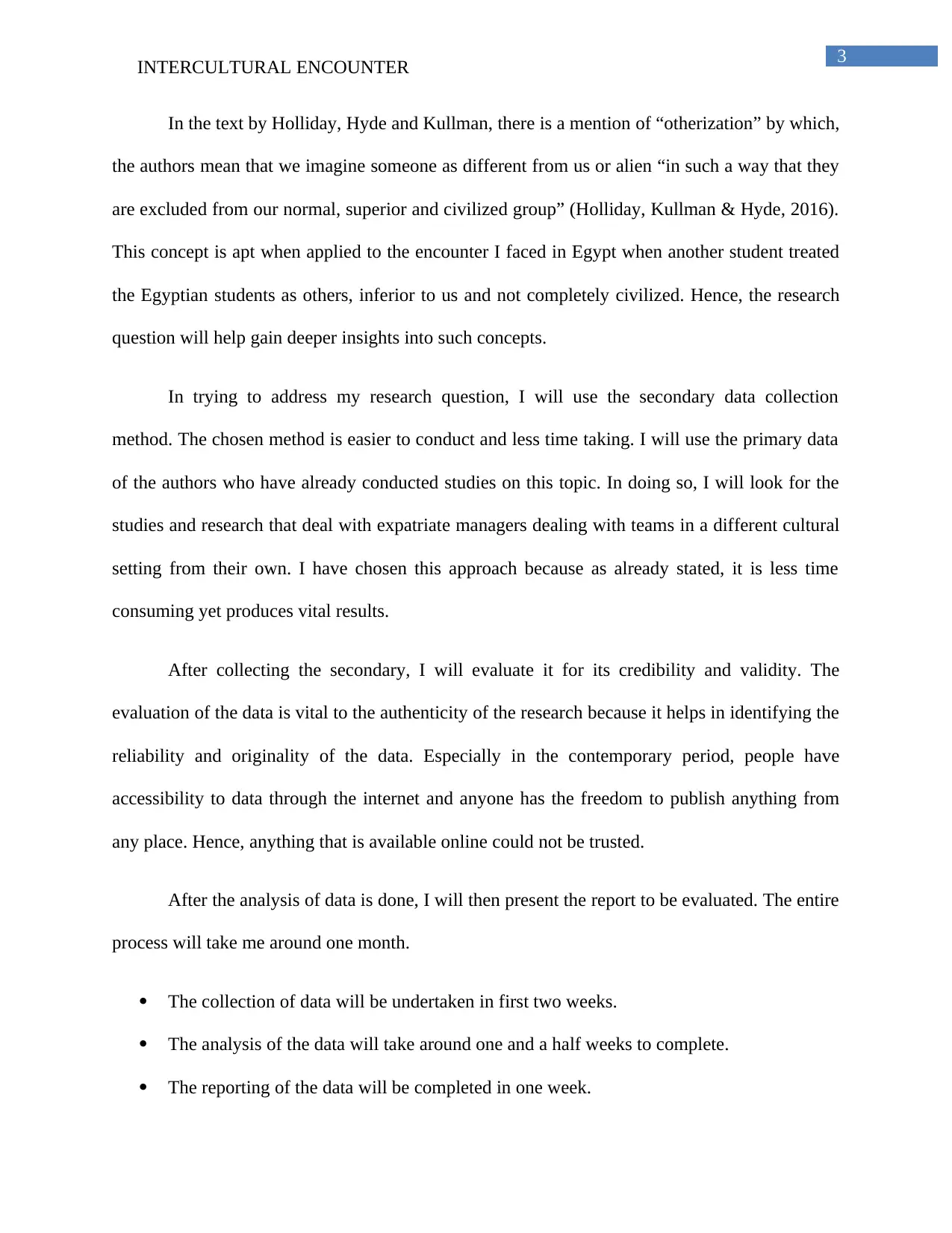
3
INTERCULTURAL ENCOUNTER
In the text by Holliday, Hyde and Kullman, there is a mention of “otherization” by which,
the authors mean that we imagine someone as different from us or alien “in such a way that they
are excluded from our normal, superior and civilized group” (Holliday, Kullman & Hyde, 2016).
This concept is apt when applied to the encounter I faced in Egypt when another student treated
the Egyptian students as others, inferior to us and not completely civilized. Hence, the research
question will help gain deeper insights into such concepts.
In trying to address my research question, I will use the secondary data collection
method. The chosen method is easier to conduct and less time taking. I will use the primary data
of the authors who have already conducted studies on this topic. In doing so, I will look for the
studies and research that deal with expatriate managers dealing with teams in a different cultural
setting from their own. I have chosen this approach because as already stated, it is less time
consuming yet produces vital results.
After collecting the secondary, I will evaluate it for its credibility and validity. The
evaluation of the data is vital to the authenticity of the research because it helps in identifying the
reliability and originality of the data. Especially in the contemporary period, people have
accessibility to data through the internet and anyone has the freedom to publish anything from
any place. Hence, anything that is available online could not be trusted.
After the analysis of data is done, I will then present the report to be evaluated. The entire
process will take me around one month.
The collection of data will be undertaken in first two weeks.
The analysis of the data will take around one and a half weeks to complete.
The reporting of the data will be completed in one week.
INTERCULTURAL ENCOUNTER
In the text by Holliday, Hyde and Kullman, there is a mention of “otherization” by which,
the authors mean that we imagine someone as different from us or alien “in such a way that they
are excluded from our normal, superior and civilized group” (Holliday, Kullman & Hyde, 2016).
This concept is apt when applied to the encounter I faced in Egypt when another student treated
the Egyptian students as others, inferior to us and not completely civilized. Hence, the research
question will help gain deeper insights into such concepts.
In trying to address my research question, I will use the secondary data collection
method. The chosen method is easier to conduct and less time taking. I will use the primary data
of the authors who have already conducted studies on this topic. In doing so, I will look for the
studies and research that deal with expatriate managers dealing with teams in a different cultural
setting from their own. I have chosen this approach because as already stated, it is less time
consuming yet produces vital results.
After collecting the secondary, I will evaluate it for its credibility and validity. The
evaluation of the data is vital to the authenticity of the research because it helps in identifying the
reliability and originality of the data. Especially in the contemporary period, people have
accessibility to data through the internet and anyone has the freedom to publish anything from
any place. Hence, anything that is available online could not be trusted.
After the analysis of data is done, I will then present the report to be evaluated. The entire
process will take me around one month.
The collection of data will be undertaken in first two weeks.
The analysis of the data will take around one and a half weeks to complete.
The reporting of the data will be completed in one week.
Paraphrase This Document
Need a fresh take? Get an instant paraphrase of this document with our AI Paraphraser
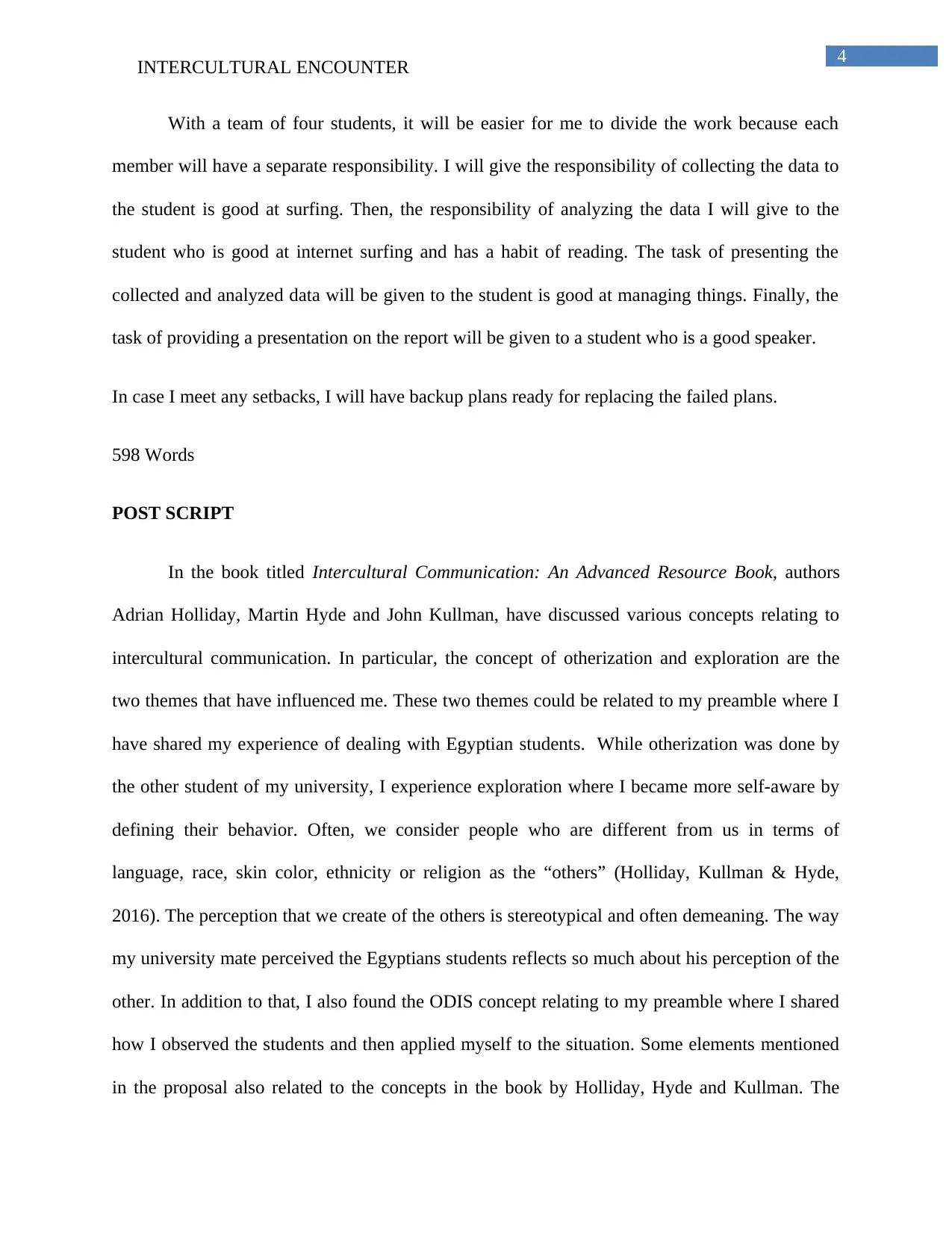
4
INTERCULTURAL ENCOUNTER
With a team of four students, it will be easier for me to divide the work because each
member will have a separate responsibility. I will give the responsibility of collecting the data to
the student is good at surfing. Then, the responsibility of analyzing the data I will give to the
student who is good at internet surfing and has a habit of reading. The task of presenting the
collected and analyzed data will be given to the student is good at managing things. Finally, the
task of providing a presentation on the report will be given to a student who is a good speaker.
In case I meet any setbacks, I will have backup plans ready for replacing the failed plans.
598 Words
POST SCRIPT
In the book titled Intercultural Communication: An Advanced Resource Book, authors
Adrian Holliday, Martin Hyde and John Kullman, have discussed various concepts relating to
intercultural communication. In particular, the concept of otherization and exploration are the
two themes that have influenced me. These two themes could be related to my preamble where I
have shared my experience of dealing with Egyptian students. While otherization was done by
the other student of my university, I experience exploration where I became more self-aware by
defining their behavior. Often, we consider people who are different from us in terms of
language, race, skin color, ethnicity or religion as the “others” (Holliday, Kullman & Hyde,
2016). The perception that we create of the others is stereotypical and often demeaning. The way
my university mate perceived the Egyptians students reflects so much about his perception of the
other. In addition to that, I also found the ODIS concept relating to my preamble where I shared
how I observed the students and then applied myself to the situation. Some elements mentioned
in the proposal also related to the concepts in the book by Holliday, Hyde and Kullman. The
INTERCULTURAL ENCOUNTER
With a team of four students, it will be easier for me to divide the work because each
member will have a separate responsibility. I will give the responsibility of collecting the data to
the student is good at surfing. Then, the responsibility of analyzing the data I will give to the
student who is good at internet surfing and has a habit of reading. The task of presenting the
collected and analyzed data will be given to the student is good at managing things. Finally, the
task of providing a presentation on the report will be given to a student who is a good speaker.
In case I meet any setbacks, I will have backup plans ready for replacing the failed plans.
598 Words
POST SCRIPT
In the book titled Intercultural Communication: An Advanced Resource Book, authors
Adrian Holliday, Martin Hyde and John Kullman, have discussed various concepts relating to
intercultural communication. In particular, the concept of otherization and exploration are the
two themes that have influenced me. These two themes could be related to my preamble where I
have shared my experience of dealing with Egyptian students. While otherization was done by
the other student of my university, I experience exploration where I became more self-aware by
defining their behavior. Often, we consider people who are different from us in terms of
language, race, skin color, ethnicity or religion as the “others” (Holliday, Kullman & Hyde,
2016). The perception that we create of the others is stereotypical and often demeaning. The way
my university mate perceived the Egyptians students reflects so much about his perception of the
other. In addition to that, I also found the ODIS concept relating to my preamble where I shared
how I observed the students and then applied myself to the situation. Some elements mentioned
in the proposal also related to the concepts in the book by Holliday, Hyde and Kullman. The
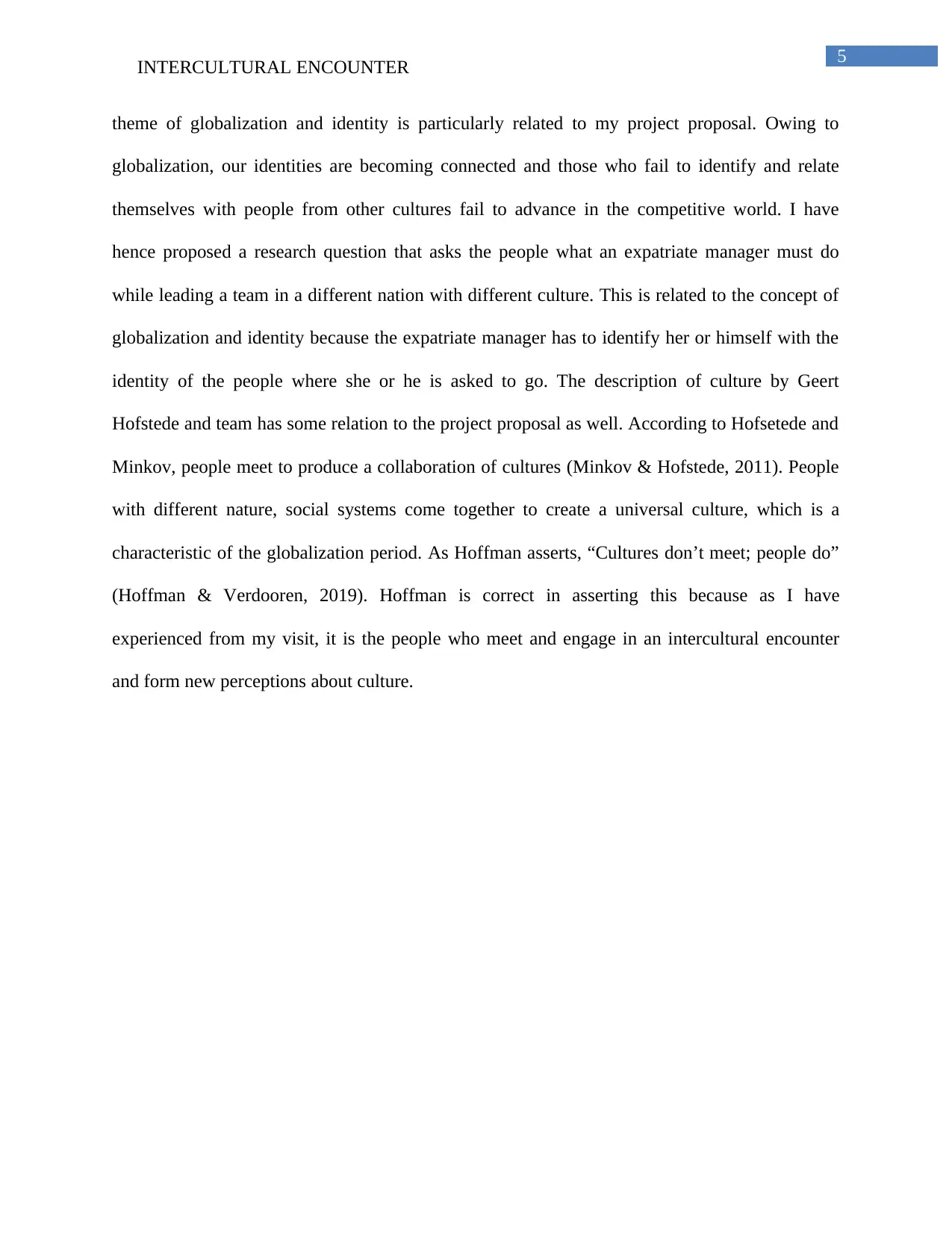
5
INTERCULTURAL ENCOUNTER
theme of globalization and identity is particularly related to my project proposal. Owing to
globalization, our identities are becoming connected and those who fail to identify and relate
themselves with people from other cultures fail to advance in the competitive world. I have
hence proposed a research question that asks the people what an expatriate manager must do
while leading a team in a different nation with different culture. This is related to the concept of
globalization and identity because the expatriate manager has to identify her or himself with the
identity of the people where she or he is asked to go. The description of culture by Geert
Hofstede and team has some relation to the project proposal as well. According to Hofsetede and
Minkov, people meet to produce a collaboration of cultures (Minkov & Hofstede, 2011). People
with different nature, social systems come together to create a universal culture, which is a
characteristic of the globalization period. As Hoffman asserts, “Cultures don’t meet; people do”
(Hoffman & Verdooren, 2019). Hoffman is correct in asserting this because as I have
experienced from my visit, it is the people who meet and engage in an intercultural encounter
and form new perceptions about culture.
INTERCULTURAL ENCOUNTER
theme of globalization and identity is particularly related to my project proposal. Owing to
globalization, our identities are becoming connected and those who fail to identify and relate
themselves with people from other cultures fail to advance in the competitive world. I have
hence proposed a research question that asks the people what an expatriate manager must do
while leading a team in a different nation with different culture. This is related to the concept of
globalization and identity because the expatriate manager has to identify her or himself with the
identity of the people where she or he is asked to go. The description of culture by Geert
Hofstede and team has some relation to the project proposal as well. According to Hofsetede and
Minkov, people meet to produce a collaboration of cultures (Minkov & Hofstede, 2011). People
with different nature, social systems come together to create a universal culture, which is a
characteristic of the globalization period. As Hoffman asserts, “Cultures don’t meet; people do”
(Hoffman & Verdooren, 2019). Hoffman is correct in asserting this because as I have
experienced from my visit, it is the people who meet and engage in an intercultural encounter
and form new perceptions about culture.
⊘ This is a preview!⊘
Do you want full access?
Subscribe today to unlock all pages.

Trusted by 1+ million students worldwide
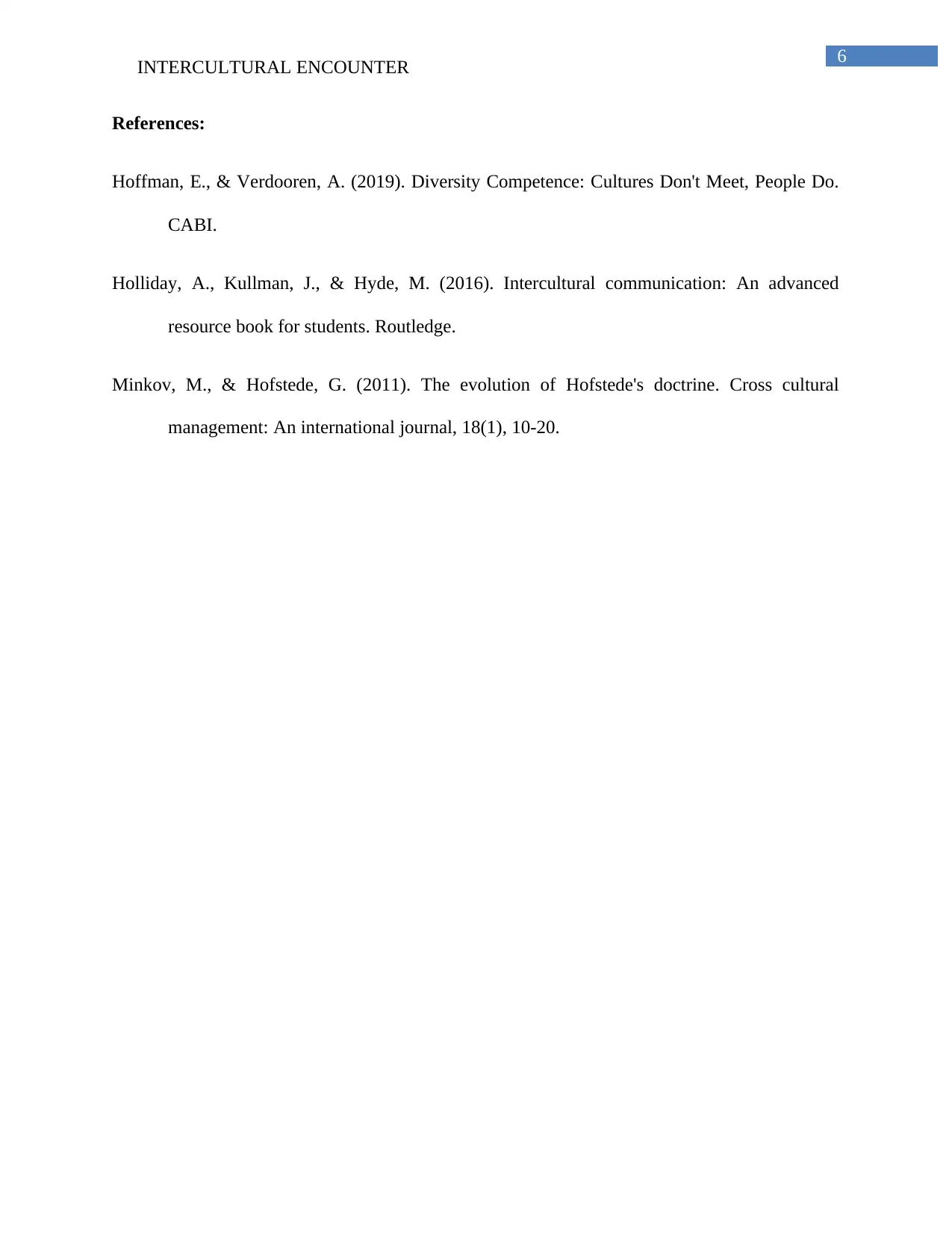
6
INTERCULTURAL ENCOUNTER
References:
Hoffman, E., & Verdooren, A. (2019). Diversity Competence: Cultures Don't Meet, People Do.
CABI.
Holliday, A., Kullman, J., & Hyde, M. (2016). Intercultural communication: An advanced
resource book for students. Routledge.
Minkov, M., & Hofstede, G. (2011). The evolution of Hofstede's doctrine. Cross cultural
management: An international journal, 18(1), 10-20.
INTERCULTURAL ENCOUNTER
References:
Hoffman, E., & Verdooren, A. (2019). Diversity Competence: Cultures Don't Meet, People Do.
CABI.
Holliday, A., Kullman, J., & Hyde, M. (2016). Intercultural communication: An advanced
resource book for students. Routledge.
Minkov, M., & Hofstede, G. (2011). The evolution of Hofstede's doctrine. Cross cultural
management: An international journal, 18(1), 10-20.
1 out of 7
Related Documents
Your All-in-One AI-Powered Toolkit for Academic Success.
+13062052269
info@desklib.com
Available 24*7 on WhatsApp / Email
![[object Object]](/_next/static/media/star-bottom.7253800d.svg)
Unlock your academic potential
Copyright © 2020–2026 A2Z Services. All Rights Reserved. Developed and managed by ZUCOL.





